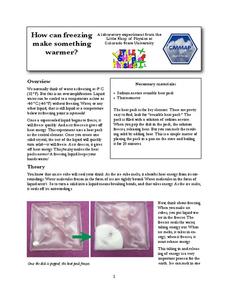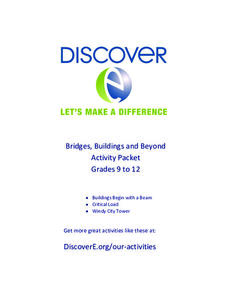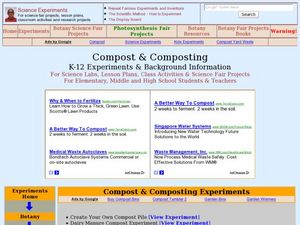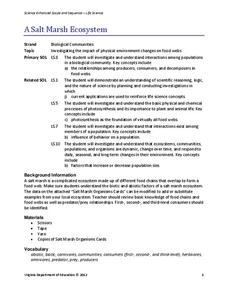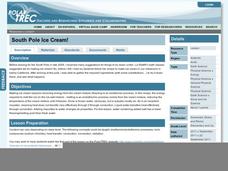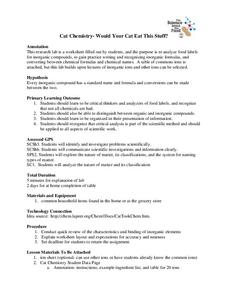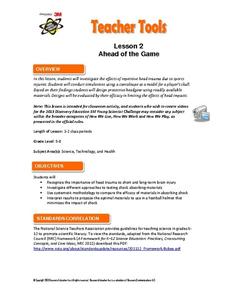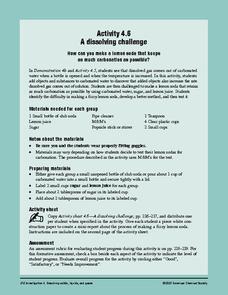Curated OER
Changes in Nature
The goal of this science lesson is to have youngsters be able to identify the physical and chemical changes in the carbon cycle, and water cycle due to weathering. The in-class inquiry/experiment is quite interesting and easy to...
Colorado State University
Can Energy Be Created or Destroyed?
Energy doesn't come out of nowhere! An engaging lesson has learners investigate energy as it transforms from one type to another. They collect data to prove that energy is not lost as it changes.
World Wildlife Fund
WWF Together
Animal lovers will enjoy this award-winning picturesque app which educates children and adults about the threats of endangered species.
Colorado State University
How Can Freezing Make Something Warmer?
Crazy fact—freezing liquid actually gives off heat! Young scholars investigate the transfer of energy when liquids freeze using a chemical heat pack. The heat pack gives off heat as its liquid core freezes.
DiscoverE
Bridges, Buildings and Beyond Activity Packet: Grades 9-12
Shore up engineering knowledge with some building activities. Scholars design a foam beam, create a structure from playing cards, and construct a paper tower that won't topple over in the wind. Along the way, they learn about engineering...
American Museum of Natural History
Around the World with DNA
DNA analysis could be what saves some animals from extinction. An interactive lesson shows learners how DNA information proves variation among animals of the same species and how stakeholders use that information to make decisions. Easy...
Curated OER
Easy as Pi
Students describe the importance of structural features that increase surface area in a coral reef habitat. In this investigative lesson students quantify the impact of modifications on surface area in model habitats.
Curated OER
It's Not Easy Being Green
Students investigate the environmental costs of operating golf courses. In this current events lesson, students visit selected websites to study golf course needs and green design options.
Curated OER
Pull(ey)ing The Science Out (Or Pulleys)
Students investigate how the number of pulleys affect the difficulty or ease of pulling an object up. They watch a demonstration that shows the work done by one pulley and two pulleys. After watching the demonstration, the students break...
Curated OER
Compost and Composting Experiments
Students investigate the composting process through a variety of experiments. In this ecology lesson, students discuss the benefits of composting. They examine how compost affect plant growth.
Virginia Department of Education
A Salt Marsh Ecosystem
What a web we weave. Pupils use yarn as the primary resource to create a web depicting the intricacies of a salt marsh ecosystem. They participate in a question and answer session, which leads to an in-depth facilitated discussion about...
Virginia Department of Education
Solar System Model
How many planets can you name? Did you get all 13 in our solar system, including the dwarf planets, or were you surprised when you read there are 13 planets? The instructional activity helps scholars understand the scale of the universe...
Odell Education
Plant and Animal Cells
Incorporate multiple facets of the cell into your next high school lab! Through an introduction to cell organelles, class members observe each cell type and draw visuals to further demonstrate understanding of cellular processes in both...
Virginia Department of Education
Cell Division
Searching for simple ways to teach mitosis to high schoolers? Using colored chalk and onion root tips, pupils visually demonstrate what they view when looking through the lens of a microscope. There are also various ways to expand the...
Polar Trec
South Pole Ice Cream!
How can you turn an ice cream activity into a scientific investigation? It's easy if you know ionic compounds, heat transfer, and the exothermic and endothermic process. Learners will explore the science behind freezing, insulation, and...
University of Georgia
Would Your Cat Eat This Stuff?
Processed foods use inorganic compounds for flavoring and preservation. This take-home laboratory challenges scholars to find 20 different compounds identified on the labels of foods to list on their data collection sheet. The activity...
K12 Reader
Step by Step Instructions
Here's a worksheet that not only provides readers with information about crafting step-by-step directions for a science project, but also serves as a reading comprehension exercise.
Discovery Education
Ahead of the Game
According to the movie Wildcats, "It's the sport of kings, better than diamond rings, football!" It is also, however, the sport of severe concussions and ongoing blows to the head. In order to keep our Seahawks soaring and Broncos...
Integrated Physics and Chemistry
Law of Conservation of Matter
Does mass change during a chemical reaction? Demonstrate the Law of Conservation of Matter while encouraging class members to be creative with a two-part lesson. First, learners use Alka-Seltzer® tablets and water to demonstrate the...
American Chemical Society
Production of a Gas - Controlling a Chemical Reaction
Though the publisher designated this unit for use with third through eighth grades, this particular lesson would be best used with middle schoolers due to the specific measurement skills required. Basically, they set up the reaction...
University of Minnesota
Mirroring Emotions
Do you ever give your class the "teacher look"? Without saying a word, they become silent and engaged (hopefully). How do they know what you're thinking? Explore the concept of nonverbal communication and how it relates to our mirror...
American Chemical Society
A Dissolving Challenge
After collecting carbon dioxide bubbles from a cup of club soda, learners attempt to make their own lemon soda while preventing the loss of carbonation. They do so by creating a syrup before mixing the substances into the club soda....
Curated OER
Applied Science - Technology (2A) Lab
Second graders experiment with simple machines. In this machine lesson, 2nd graders go to different labs to see examples of a lever, inclined plane, wedge, pulley, gears, and wheel and axle. They discuss how a machine makes work a lot...
Curated OER
Honesty and Ethics in the Science Lab
Students complete a variety of lab and discussion activities as they are introduced to ethics and honest lab practices. They perform various biology, chemistry, or physics labs which test their ethical lab practices.





